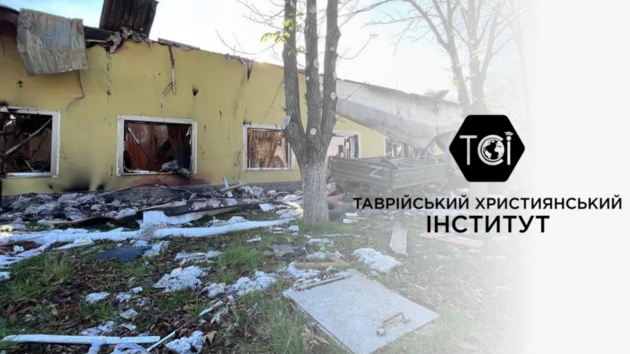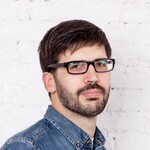Crystal months. How in Kherson the Russian army turned a Christian institute into a military base and looted it

The Protestant Tavriski Christian Institute (PTCI) is located in a very attractive location in Kherson – right on the banks of the Dnieper.
Before the Russian attack on Ukraine on February 24, the institution had up to 150 students and since 1997 has been a center for the training of theologians (with a state license) and pastors at least for Ukrainian Baptists, who by the beginning of 2022 numbered more than 100 thousand. The Protestant Tavriski Christian Institute (PTCI) had a luxurious theological library, one of the largest in the south of Ukraine, containing 30,000 books.
As soon as the offensive began, the administration took the documents and personal belongings of the students from the educational center with the help of cars. The first convoy from the Protestant Tavriski Christian Institute (PTCI) saved about 70 people (employees and students of universities) from the occupation. The last car with employees, students and young people from Kherson Protestant churches left the institute after lunch.
Darkness
Russian troops were stationed in Kherson on March 1. After the complete occupation of the city, 36-year-old Oleksii Pushkarskyi, who had previously been a builder and de facto administrator of the institute, looked after the abandoned buildings of the theological school.
The educational center itself turned into a humanitarian headquarters: during the entire occupation, employees and volunteers distributed about 30 tons of food to local residents. In addition, the Protestant Tavriski Christian Institute (PTCI) purchased products from farmers who worked in the territory controlled by the Russian Federation – food was distributed to the Kherson people in churches. But it was done completely secretly. "I confidently say that in Kherson (during the occupation. - O.H.) the population received the main help from the churches. The Evangelical Church in the occupied territories courageously helped the locals and suffered greatly during the occupation. Probably more than any other denomination," says the 46-year-old rector of the Protestant Tavriski Christian Institute (PTCI) Valentyn Synii.
On March 9, the 37-year-old vice-rector Leonid Matseyko received a phone call from a security guard named Anatoly and said that two Russian soldiers had arrived at the institute. It became clear that their units were looking for a base. "The very next day, March 10, about 200 Russians came to the Protestant Tavriski Christian Institute (PTCI) in armored personnel carriers and cars. As far as I remember, it was the National Guard of the Russian Federation," Valentyn Synii clarifies.
After moving into the premises of the institute, the military told the employees not to worry. "We came to save you from the Bandera people, so we will not touch anything, all your property remains with you," they assured the Christians.
Within a week, other servicemen arrived instead of units of the National Guard of the Russian Federation. Which, according to eyewitnesses, began to crush literally everything. According to the guard, one soldier was standing in the middle of the courtyard and was shooting at the windows with a machine gun. Anatoly turned to the military: "Why are you doing this? Your people promised us that they would not touch the buildings." In response, the Russian put a machine gun to the man's head and said: "If you say something again, these will be your last words."
The institute was not the only religious organization seized by Russian troops. Even during the occupation, the Kherson branch of the Bible Society functioned in the city – a religious non-profit aimed at spreading the Holy Scriptures in Ukrainian. On August 24, a group of soldiers broke into the organization's office. Oleksandr Babiychuk, the general secretary of the Ukrainian Bible Society, says that, according to the Russians, partisans were hiding here and they came to capture them. The saboteurs were never found, but the building was seized, a headquarters was set up in it, and it was used until the liberation of Kherson. "They looked over all the things and threw out everything possible from the shelves," says Babiychuk. – We were told: "Bible work is your cover. You are actually American agents.”
After seizing the Protestant Tavriski Christian Institute (PTCI), Russian units quickly turned it into a convenient logistical and training hub. Some premises were used as barracks, others as a military hospital. This is evidenced by traces of blood on the second floor of one of the buildings. The Russian army instantly "redesignated" another building into a weapons warehouse, and the sports field into a training ground.
Struggle with property and books
Over time, the degree of hostility of the Russian soldiers only increased. On April 19-20, a security guard called Leonid Matseyko again around 4:00 p.m. "The Russians are breaking down the door. They take with them everything that they can. What should I do?" he asked nervously. The vice-rector asked Anatoly to find an officer to talk to him. The Russian picked up the phone, but did not identify himself and asked who was on the other end of the line. Leonid Matseyko noted that he is the head of the institution. After that, the Russian officer asked him to come to the Protestant Tavriski Christian Institute (PTCI), but the man refused, because he already lived in Ivano-Frankivsk. The following dialogue lasted less than a minute:
"Your previous group promised that they would not touch our property," said Leonid Matseyko.
— And we already know the whole truth. In particular, we know that the Protestant Tavriski Christian Institute (PTCI) is not an institute, but an American sect that has no right to exist in the Russian Federation. Kherson is a Russian city, so there will be no sect here. From now on, the confiscated property of the institute belongs to the Russian state, – answered the military Russian.
— But this equipment is used for children's camps! Why do you need it?
— I'm not interested in this. Either you come to Kherson for a face-to-face conversation, or we continue the "confiscation".
— I'm sorry, I'm in Ivano-Frankivsk right now and I can't come.
— Then there is the last offer: you must pay 500 dollars for each item we take.
"I decided that trading with them was absurd, so I quickly refused," recalls Leonid Matseyko. "During this conversation, the Russian expressed an opinion that really scared us: 'We will bury people like you alive (or we have already buried them)'," Valentyn Synii adds.
Russian soldiers proved to be skilled not only in threats, but also in looting. That day they opened and broke safes in an attempt to find valuables. After that, they drove up big trucks and started loading them with everything suitable for removal – office equipment and those things that had value. Russian soldiers removed plasma televisions. In addition, they also took a 70-inch interactive whiteboard, mattresses, beds, furniture and office equipment. Also, the soldiers of the Russian Federation took out shovels and rakes, that is, everything that can be taken out. With the help of screwdrivers, the sockets were carefully removed from the residential blocks. They even ate porridge for dogs, and the dogs themselves were shot.
According to the data of the Ukrainian human rights NGO "Institute of Religious Freedom", Russian soldiers stole $68,400 worth of property and technical equipment. Valuables, which the occupiers did not have time to take away, were later taken by local residents.
Part of the library, which contained more than 30,000 publications, was taken to the city dump by Russian soldiers. "We also heard that, looking at our English- and Ukrainian-language literature in the first days of the seizure of the Protestant Tavriski Christian Institute (PTCI), the Russians said that these "Nazi" books should be wiped off the face of the earth. They could have destroyed it, but they chose to throw the books in the trash. It's hard to find the right words," Valentyn Synii admits. Another significant part of the institute's library was taken away by the Russians in an unknown direction. There is no sign of book burning on campus. At the cost of one theological edition of about 10 dollars, the damage caused by the liquidation of the institute library by the Russians is estimated at a third of a million US dollars.

Liberation and a new beginning
On November 11, after the liberation of Kherson, advanced assault units of the Armed Forces of Ukraine entered the territory of the institute.
For the Protestant Tavriski Christian Institute (PTCI), resuming studies in Kherson is such an extremely difficult mission that even Tom Cruise himself would not be able to cope with under the current circumstances. First of all, officially the Protestant Tavriski Christian Institute (PTCI) is still a "gray" zone where mines are located. Secondly, the territory of the institute is now the front line or "zero zone". On the left side, where the Antonivskyi bridge is located, Russian mortar and sniper attacks are still ongoing. The Russian army is shelling a 100-meter zone from the banks of the Dnieper (this is 35–40% of the territory of the institute). In December 2022, Russian artillery completely destroyed the dormitory and the dining room. As a result, employees of the Protestant Tavriski Christian Institute (PTCI) can neither thoroughly inspect the buildings nor safely stay on their territory.
Back in 2014, during the occupation of Crimea, the Russians seized the Protestant Ukrainian-American College, located in the heart of the peninsula – Simferopol. And in July of the same year, they established control over a complex of six buildings of the Donetsk Christian University and the large Donetsk Pentecostal church "Word of Life". In Kherson, history proved its cyclical nature: already in 2022, in just nine calendar months, Russian troops destroyed the Protestant Tavriski Christian Institute (PTCI).
This story is only a small and at the same time characteristic fragment of a large-scale mosaic about the pressure of Russian troops on Ukrainian Protestantism, whose active pro-Ukrainian position since 2022 and the volunteer movement frankly annoy the Kremlin.
Please select it with the mouse and press Ctrl+Enter or Submit a bug











 Login with Google
Login with Google